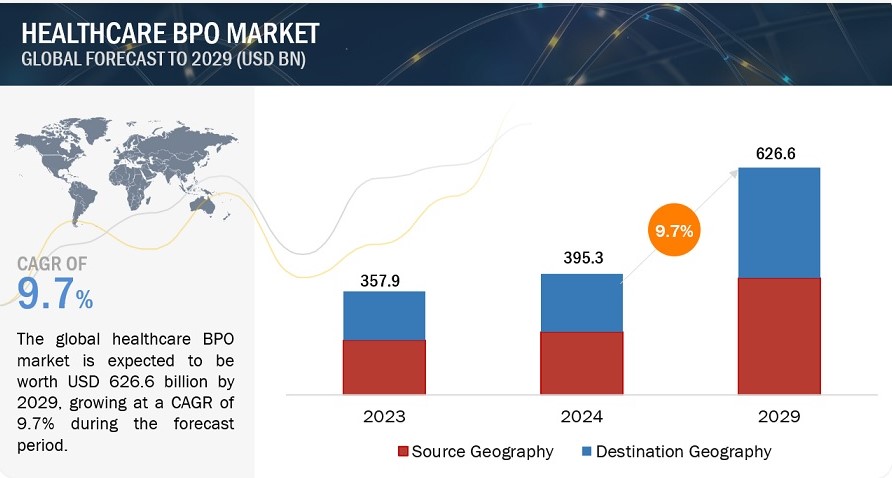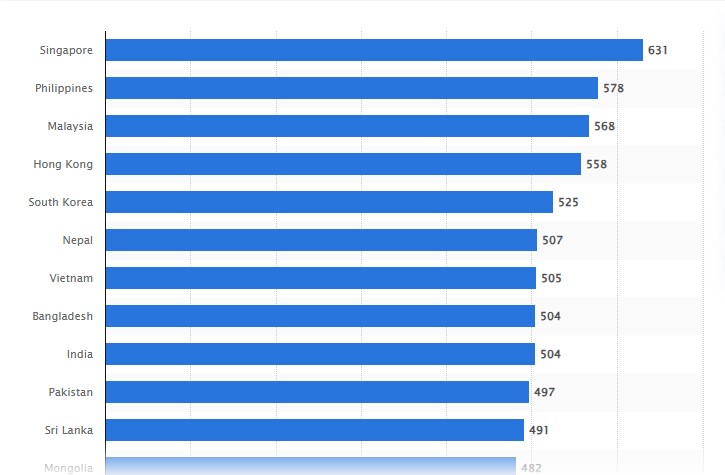Healthcare organizations today face significant rising costs and talent shortages.
Each year, the United States spends nearly $1 trillion on healthcare administrative tasks alone.
An Experian survey reveals that healthcare providers persistently struggle to find qualified, entry-level staff for non-clinical roles.
These challenges significantly hinder healthcare providers’ operational efficiency and their ability to effectively complete.
This post will explore how offshore talent offers a practical solution to these growing challenges. We’ll look at how outsourcing not only can help reduce costs and bridge critical talent gaps, but also empower healthcare organizations to operate more efficiently.
I. The Role of Offshore Talent in Healthcare: A Cost-Efficient Solution
The healthcare industry is increasingly turning to offshore talent as a practical way to handle non-clinical tasks.
The global Healthcare BPO market is expected to increase from $395.3 billion in 2024 to $626.6 billion by 2029.

By outsourcing such roles to skilled professionals in countries with lower labor costs, providers can reduce expenses without compromising quality.
This approach not only helps cut costs but also boosts operational efficiency and flexibility.
Cost Reductions in Offshoring Administrative Tasks
Healthcare providers often face heavy expenses on tasks that don’t directly contribute to patient care. Administrative activities like billing, transcription, and data entry eat up a huge portion of the healthcare budget.
By offshoring these non-clinical roles, healthcare facilities can boost profitability and achieve significant cost reductions.
According to a Deloitte study, healthcare organizations in the U.S. can pay practically half their labor costs by outsourcing medical billing, administrative data entry, and other tasks to skilled offshore professionals.
Such a move can translate to millions of dollars saved annually, which can then be invested back into patient care, technology, or expansion of services.
Improved Operational Efficiency and Data Management
Outsourcing non-clinical roles increases operational efficiency by providing around-the-clock support, particularly for IT and data management roles.
Offshore teams work across different time zones, ensuring that healthcare systems are monitored and maintained 24/7. This uninterrupted support means that critical services stay operational round the clock.
Offshore data management teams can process large volumes of data faster and more cost-effectively. By outsourcing medical coding, claims processing, and data entry, healthcare providers can reduce bottlenecks and deliver a smoother experience for both staff and patients.
For instance, one major healthcare provider saw a 25% improvement in billing turnaround time after offshoring its medical coding and billing functions, leading to faster reimbursement cycles and higher patient satisfaction.
Flexibility in Managing Non-Clinical Tasks
Offshore talent also enables healthcare organizations to scale their operations based on demand, adding flexibility that would be challenging to achieve solely with local hires.
Offshore providers can quickly adjust their staffing levels to accommodate peaks in administrative workload, such as during flu season or periods of high patient volume—allowing healthcare providers to respond to seasonal demands without incurring long-term staffing costs.
The integration of technology further simplifies this process, making it seamless to scale up or down as needed. With cloud-based platforms, task management systems, and real-time communication tools, offshore teams can be onboarded, trained, and deployed with remarkable speed.
For instance, during high-demand periods, healthcare organizations can use automation to delegate repetitive data entry tasks, enabling offshore teams to focus on more complex responsibilities.
Moreover, advanced software solutions, such as Electronic Health Record (EHR) systems and workflow automation tools, ensure that offshore staff can efficiently handle scheduling, billing, and patient communications.
By leveraging technology, healthcare providers can maintain smooth operations during demand surges while reducing the administrative burden on their in-house teams.
II. How Offshore Healthcare Support Can Enhance Patient Care

Outsourcing non-clinical roles allows healthcare organizations to direct more resources toward patient care. By transferring administrative, IT, and telehealth support tasks to qualified offshore teams, healthcare providers can streamline their operations, reduce overhead, and free up critical resources.
-
Offshoring Frees Up Time and Resources
Administrative activities consume valuable time and resources that could otherwise be spent on patient-centered activities. When healthcare providers outsource tasks like billing, data entry, and appointment scheduling, they free up in-house staff to focus on core functions that directly impact patient care.
This shift can also lead to more thorough patient consultations, quicker response times, and a greater focus on care quality.
In a Black Book Survey, 93% of the surveyed healthcare providers reported plans to engage in more outsourced services for its positive impact on patient care.
By offloading non-clinical responsibilities to offshore support teams, healthcare providers can reinvest those savings into newer equipment, additional training, patient outreach programs, or hiring more clinical staff, all of which contribute to better patient outcomes.
-
Offshoring Enhances IT System Reliability
Keeping healthcare IT systems secure and operational is crucial for patient care, especially as hospitals and clinics increasingly rely on digital records, telehealth platforms, and other technology-driven services.
Offshore IT support ensures that these systems are maintained, updated, and supported around the clock.
With the support of skilled IT teams, healthcare facilities can avoid costly downtime, address technical issues promptly, and maintain data security protocols critical to patient privacy.
-
Offshoring Enables Continuous Patient Support
Maintaining continuous support can be challenging for facilities operating within limited time zones. Offshore telehealth support staff can fill this gap by offering round-the-clock service, ensuring that patients can reach qualified staff no matter the time of day.
This continuous coverage is especially valuable for managing chronic conditions, post-operative care, and mental health support, where immediate access can have a significant impact on outcomes.
Offshoring non-clinical roles in healthcare provides substantial benefits that go beyond cost savings. By outsourcing administrative and IT tasks, healthcare organizations can reallocate resources to enhance patient care, strengthen IT system reliability, and expand telehealth capabilities—leading to an environment where providers can deliver the best possible care.
III. Offshore Roles in Healthcare: Who Can You Outsource?

-
Medical Billing and Coding
Medical billing and coding are critical functions in healthcare that ensure the accurate processing of claims and reimbursements. Offshoring these roles allows healthcare organizations to efficiently handle billing operations at a fraction of the cost.
-
Medical Transcription
Medical transcription is essential for maintaining accurate and up-to-date patient records. Offshore transcriptionists are trained to transcribe detailed medical notes, diagnostics, and procedural information while meeting strict confidentiality and compliance standards.
-
IT Support and Cybersecurity
Offshore IT support teams offer 24/7 monitoring, troubleshooting, and cybersecurity measures—helping healthcare organizations avoid downtime and mitigating cyber threats. Offshore cybersecurity experts are skilled in implementing compliance-driven security protocols, firewalls, and data encryption to protect against any unauthorized access.
-
Data Entry and Administrative Functions
Data entry and administrative functions are time-consuming tasks that, while crucial, do not require on-site staff. Offshore data entry teams can manage a variety of administrative functions, from processing patient intake forms to managing records. By outsourcing these roles, healthcare providers can streamline operations and reduce the workload of in-house staff.
-
Telehealth Support Roles
The rise of telehealth has introduced new administrative needs, including: managing virtual appointments, patient follow-ups, and technical support for telehealth platforms. Offshore staff can handle telehealth-related tasks, such as scheduling, patient intake, and tech support, ensuring a seamless experience for both patients and healthcare providers.
Offshoring these roles eases the operational pressures on your on-site staff and ensures prompt care of patients.
In the next section, we’ll explore why the Philippines stands out as a top destination for outsourcing these healthcare support roles.
IV. The Philippines: A Hub for Skilled Healthcare Support Professionals
The Philippines has become a premier choice for healthcare organizations looking to outsource non-clinical support roles.
The country offers a robust pool of skilled professionals with experience in critical support functions, along with high English proficiency and a strong cultural alignment with Western healthcare practices.
Here’s a closer look at why the Philippines is an ideal destination for healthcare support roles.
-
A Growing Pool of Healthcare Support Professionals
The Philippines is home to a large workforce skilled in non-clinical healthcare roles, including medical transcription, billing, coding, and customer service for healthcare providers.
The Philippines offers a wide selection of candidates who understand the demands of healthcare support.
This growing talent pool is essential for healthcare organizations struggling to find qualified professionals locally. By tapping into this offshore resource, they can fill essential non-clinical positions quickly, improving service delivery.
The Philippine government nurtures the outsourcing industry, as a whole, through economic incentives and legal support—with outsourcing being a healthy contributor to the Philippine economy, bringing in almost $38 billion in 2024 and beating expectations.
-
High English Proficiency and Cultural Compatibility
The Philippines consistently ranks among the top countries in English proficiency in Asia, second only to Singapore in the English Proficiency Index (2022)

Source: www.statista.com Filipino healthcare and IT professionals are trained in English from an early age, with English being the primary language for education, particularly in medical and technical fields. This ensures seamless interactions with patients, providers, and insurance companies.
In addition, the Philippines has a strong understanding of Western standards and practices due to its historical background, and the many decades of the country collaborating with the West.
Such familiarity fosters smoother working relationships and intuitive interactions.
-
A Track Record of High-Quality Healthcare Services
The Philippines has already built a strong reputation for delivering high-quality healthcare support services.
The country’s outsourcing industry has been a significant part of the economy for years, with a particular focus on providing reliable healthcare services.
Philippine-based outsourcing providers adhere to global standards, including HIPAA and other compliance protocols, ensuring that sensitive patient information is handled with utmost care and precision.
Outsourcing healthcare support to the Philippines allows organizations to benefit from a highly skilled workforce, fluent English communication, and a deep understanding of Western healthcare expectations.
With proven experience and commitment to quality, the Philippines is the ideal location for healthcare organizations.
V. A Road Map for Offshoring Non-Clinical Healthcare Roles

Here’s a guide to establishing healthcare support operations offshore:
-
Identify Roles for Offshoring
Conduct a thorough analysis of your current staffing structure to identify areas where offshoring can relieve administrative burdens and enhance productivity.
The most common roles outsourced include:- Medical billing and coding
- Medical transcription
- IT support
- Data entry and
- Telehealth support
-
Conduct due diligence
When outsourcing healthcare roles, working with vendors who understand the unique challenges of the healthcare industry is essential. Your partner should have:
- HIPAA Compliance: They should have processes in place to ensure patient data privacy and compliance with U.S. regulations like HIPAA (Health Insurance Portability and Accountability Act).
- Industry Knowledge: Familiarity with medical terminology, insurance processes, and healthcare-specific transactions and technologies makes the transition smoother and reduces training costs.
Conduct due diligence on a potential partner to determine fit.
Drop vendors who can’t prove their claims. Avoid those who cannot provide verifiable client references, case studies, or examples of past work. If they can’t back up their claims with real-world evidence, it’s a major red flag.
-
Establish Clear Contracts and Service Level Agreements (SLAs)
Once you’ve chosen a provider, get everything in writing. Setting up a well-defined contract with detailed Service Level Agreements (SLAs) is essential for ensuring that both the healthcare provider and its partner are on the same page.
SLAs are the foundation of the outsourcing relationship, outlining expectations, performance standards, and remedies for unmet terms. Much of the remaining items in this “roadmap” should be clearly stated in the SLA. Key components to include are:
- Performance Metrics: Define clear performance metrics relevant to the outsourced role. These metrics help measure the vendor’s performance objectively.
- Compliance Standards: This should include data protection protocols, audit requirements, and periodic compliance reviews.
- Dispute Resolution Procedures: Specify how disputes will be handled, whether through mediation, arbitration, or legal action, and detail the timelines for addressing issues.
- Termination Clauses: A flexible termination clause protects the organization if the outsourcing relationship no longer meets expectations.
-
Establish Clear KPIs and Quality Benchmarks
When outsourcing critical tasks, set up Key Performance Indicators (KPIs) and benchmarks to monitor quality and efficiency. Examples of KPIs for healthcare include:
- Claims Processing Time: Measures the time it takes for claims to be submitted, reviewed, and processed.
- Error Rates in Billing: Tracks billing errors, which can affect reimbursements and patient satisfaction.
- Appointment Booking Accuracy: Monitors the accuracy and efficiency of patient scheduling to minimize no-shows and improve patient flow.
- Response Time for IT Support: For outsourced IT, track the response and resolution time for technical issues, that directly impact healthcare services.
Write the KPIs into the contract.
-
Double-check Data Security Procedures
Data security is paramount in healthcare, so working with outsourcing vendors that prioritize data privacy is non-negotiable. Insist on these practices before moving forward:
- Vendor Security Audits: Regular audits to assess data security practices, particularly for vendors handling patient information.
- Encryption and Secure Channels: Ensure all patient information is encrypted, and only authorized personnel can access sensitive data.
- Training on HIPAA and Data Privacy: Vendors should conduct regular training to ensure staff are aware of HIPAA requirements and other data privacy laws.
-
Establish Communication Policies
Effective communication with outsourcing partners is essential to maintain workflow and address issues quickly. Best practices include:
- Scheduled Check-Ins: Set weekly or monthly meetings to review performance, or resolve any issues.
- Dedicated Persons of Contact: Designate contact persons on both sides to ensure smooth communication and quick resolution of queries.
- Detailed Reporting Systems: Establish reporting schedules to review metrics like processing times, error rates, and patient satisfaction scores.
-
Pilot Before Full Implementation
Starting with a pilot program can help assess the effectiveness of the outsourcing partnership and make any necessary adjustments before a full-scale rollout. A pilot program allows healthcare providers to:
- Test Performance: Measure the vendor’s performance on a small scale before expanding the contract.
- Evaluate Workflow Integration: Assess how well the vendor integrates with existing systems and workflows.
- Identify Training Needs: Determine if additional training is required to align vendor practices with the healthcare organization’s standards.
-
Calculate and Track ROI
Understanding the return on investment (ROI) for outsourcing is crucial in determining whether the decision is cost-effective. Factors to track include:
- Cost Savings: Compare costs before and after outsourcing to evaluate potential savings.
- Productivity Gains: Measure productivity improvements, such as faster claim processing, which can enhance cash flow.
- Quality Improvements: Assess any improvements in accuracy, patient satisfaction, or compliance.
-
Monitor and Adjust as Needed
Outsourcing is not a “set it and forget it” solution. Regular monitoring and continuous improvement can ensure the partnership remains beneficial. Areas to monitor include:
- Performance Against KPIs: Regularly review performance metrics to ensure they align with organizational goals.
- Adjusting for Changes in Workload: If the healthcare provider’s workload changes, communicate with the outsourcing partner to adjust staffing or resources.
- Renewal and Contract Re-evaluation: At contract renewal, assess the vendor’s performance, costs, and any organizational changes to decide whether to continue the partnership.
-
Planning an Exit Strategy
An exit strategy prepares the parties for a smooth transition if the outsourcing partnership needs to end due to performance issues, cost changes, or a shift in priorities. Key elements of an exit strategy include:
- Knowledge Transfer and Documentation: If the outsourcing relationship ends, this documentation will help onboard new partners or facilitate a smooth handover to internal teams.
- Data Transfer Protocols: This is especially critical for patient information, which must be handled in compliance with data privacy regulations.
- Wind-Down Period: Specify a transition period in the contract that allows for a gradual handover, usually ranging from 30 to 90 days, to prevent sudden operational disruptions.
- Termination Costs and Conditions: Knowing these in advance can help the healthcare provider budget accordingly and avoid financial strain.
Outsourcing non-clinical healthcare roles can offer significant benefits. By selecting the right roles, establishing clear benchmarks, and prioritizing data security, healthcare providers can create a productive partnership that supports their overall mission.
With careful monitoring and periodic adjustments, outsourced functions can become a reliable extension of healthcare operations, enabling providers to focus more effectively on patient care.
For organizations looking to streamline operations and reduce costs, partnering with an experienced offshore staffing provider like Kinetic Innovative Staffing can be the key to staying competitive.
Whether you need support in healthcare, IT, customer service, or any other area, Kinetic offers a wide range of remote staffing solutions tailored to meet the unique needs of your industry.
Contact Kinetic today to learn how offshoring can empower your team to achieve more.
Kinetic Innovative Staffing has been supporting businesses across Asia Pacific, North America, the Middle East, and Europe with highly skilled remote professionals from the Philippines since 2013. Contact us today to discover how we can support your team.






